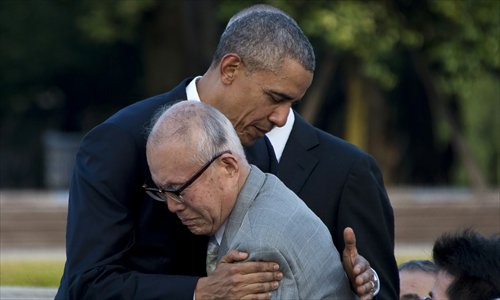Obama mourns dead on Hiroshima visit
Remember Nanjing: Chinese FM

US President Barack Obama hugs Shigeaki Mori (front), a survivor of the 1945 atomic bombing of Hiroshima, during a visit to the Hiroshima Peace Memorial Park on Friday. Obama, the first sitting US president to visit the city, paid moving tribute to victims of the world's first nuclear attack, in spite of protests by some Japanese citizens against his visit. Photo: AFP
Barack Obama on Friday became the first incumbent US president to visit Hiroshima, site of the world's first atomic bombing, in a gesture Tokyo and Washington hope will showcase their alliance and reinvigorate efforts to rid the world of nuclear arms.
Even before it occurred, the visit stirred debate, with critics accusing both sides of having selective memories, and pointing to paradoxes in policies relying on nuclear deterrence while calling for an end to atomic weapons.
"It is worth focusing on Hiroshima, but it's even more important that we should not forget Nanjing," Chinese Foreign Minister Wang Yi told reporters on Friday, referring to the massacres by Japanese troops committed in China's then-capital of Nanjing in 1937.
Some conservative Japanese politicians and scholars deny a massacre took place at all.
"The victims deserve sympathy, but the perpetrators can never escape their responsibility," Wang said.
Japan and the US hope Obama's visit to Hiroshima, where a US atomic bomb killed thousands instantly on August 6, 1945, and some 140,000 by the year's end, underscores a new level of reconciliation and tighter ties between the former enemies.
"We come to ponder the terrible force unleashed in the not so distant past," Obama said after laying a wreath at a Hiroshima peace memorial.
Before laying the wreath, Obama visited a museum where haunting displays include photographs of badly burned victims, the tattered and stained clothes they wore and statues depicting people with flesh melting from their limbs.
After speaking, Obama shook hands and chatted briefly with two atomic bomb survivors. Obama and Sunao Tsuboi, 91, smiled as they exchanged words; Shigeaki Mori, 79, cried and was embraced by the president.
The city of Nagasaki was hit by a second nuclear bomb on August 9, 1945, and Japan surrendered six days later.
A majority of Americans see the bombings as having been necessary to end the war and save lives, though some disagree fiercely. Most Japanese believe they were unjustified.
The White House had debated whether the time was right for Obama to break a taboo on presidential visits to Hiroshima. But Obama's aides defused most negative reactions by insisting he would not second-guess the decision to drop the bombs.